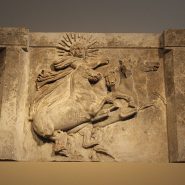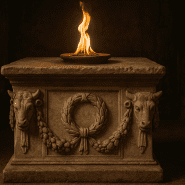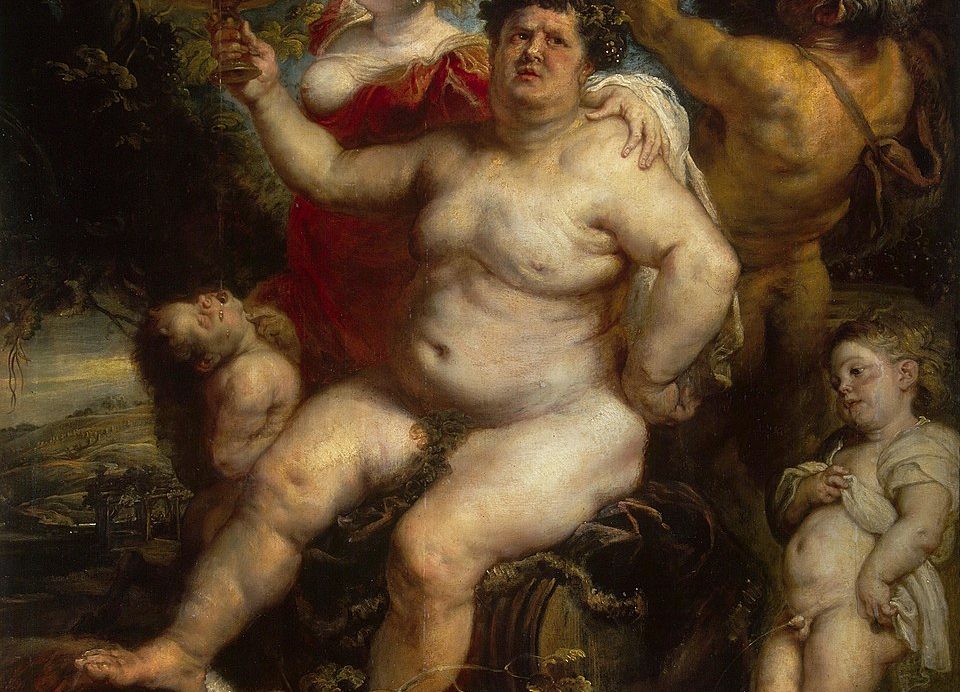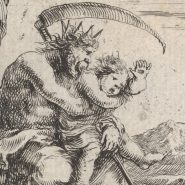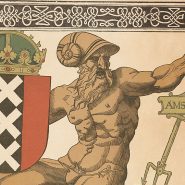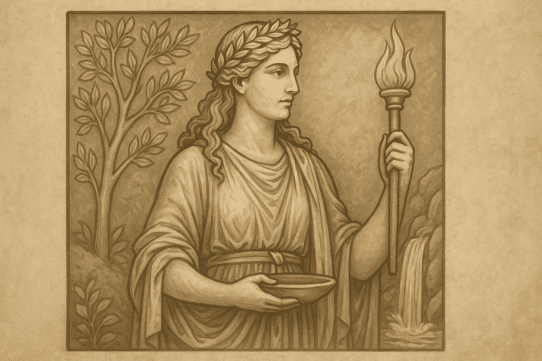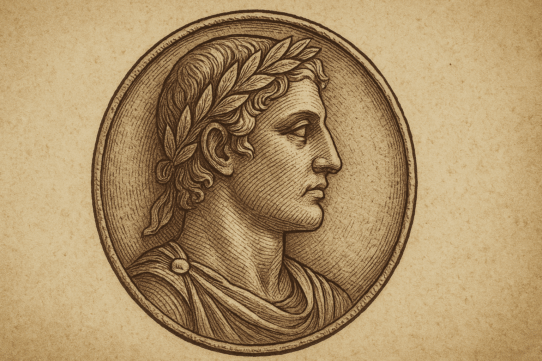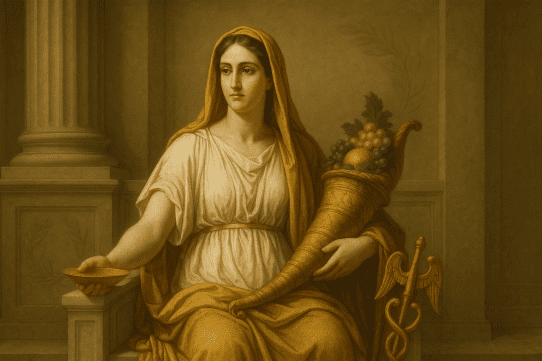Overview
Bacchus (pronounced ba·kuhs), the Roman god of wine, festivity, and freedom, embodied the spirit of joy, transformation, and divine madness. Known as the liberator of both body and soul, he represented the power of nature’s vitality and the breaking of boundaries — between reason and passion, life and death, mortal and divine.
To the Romans, Bacchus was more than a symbol of indulgence; he was the god of release and renewal, teaching that ecstasy and chaos could also lead to insight and rebirth. Through wine, music, and ritual, his worshippers sought not excess, but the transcendence that comes when one embraces the fullness of life.
Name and Origin
The name “Bacchus” comes from the Latin adaptation of the Greek “Bakchos,” an epithet of Dionysus, his Greek counterpart. While Dionysus originated in the vineyards and wild hills of Greece, Bacchus took on a distinctly Roman character: less mystical and more celebratory, a god of vitality and social harmony.
His cult arrived in Rome in the 2nd century BCE, spreading rapidly among both the elite and the common people.
Though his rites were later restricted for their fervor, his influence endured as a symbol of freedom, pleasure, and divine connection to nature’s rhythms.
Attributes and Symbols
Bacchus was typically depicted as a youthful, handsome god crowned with ivy and vine leaves, holding a thyrsus — a staff tipped with a pinecone and entwined with ivy. His companions, the satyrs and maenads, danced beside him in ecstatic celebration, playing flutes and cymbals.
Grapes, leopards, and wine cups were his sacred emblems, symbolizing transformation, sensuality, and power. The ivy represented immortality, for it remained green even in winter, while the grapevine spoke of joy and renewal.
Bacchus’s image embodied contradiction: gentle and wild, civilizing and untamed, reminding Romans that life’s true vigor lies between restraint and abandon.
Family and Relationships
According to myth, Bacchus was the son of Jupiter and Semele, a mortal princess of Thebes. When the jealous Juno deceived Semele into demanding that Jupiter reveal his divine form, the mortal woman was consumed by lightning. Jupiter rescued their unborn child and sewed him into his thigh until the time of birth — a miraculous second birth that made Bacchus twice-born, symbol of resurrection and renewal.
Raised by nymphs on Mount Nysa, he discovered the vine and taught humanity the art of winemaking. His many lovers included Ariadne, whom he found abandoned by Theseus and crowned with immortality, placing her wreath among the stars. Their union represented love redeemed by divine joy.
Myths and Stories
Bacchus’s myths celebrated transformation, liberation, and divine revelation.
One famous tale tells how he traveled the world teaching viticulture, bringing the gift of wine to humankind. When pirates captured him, believing him an ordinary youth, their ship filled with vines, and he transformed into a lion, driving them into the sea. Those who leapt overboard became dolphins, forever bound to the sea they once ruled.
In another story, Bacchus punished King Pentheus of Thebes for mocking his worship, luring him into the forest disguised as a woman, where the frenzied maenads tore him apart — a warning against the denial of nature’s divine force.
Yet Bacchus was also a healer and a god of compassion. He descended to the underworld to rescue his mother Semele, bringing her to Olympus as Thyone, goddess of divine passion.
Through such myths, Bacchus revealed his dual nature: destroyer of pride, but savior of the sincere. His mysteries promised rebirth through ecstasy — a sacred madness that freed the spirit from fear and repression.
Domains and Powers
Bacchus ruled over wine, fertility, theatre, and ecstatic inspiration. His power extended beyond vineyards to every form of emotional and creative expression. He governed the life force that drives growth, art, and transformation — the energy that dissolves boundaries between mortals and the divine.
To worship Bacchus was to surrender to this force, not in excess but in release: freeing oneself from fear, guilt, and rigidity. His domain included both joy and tragedy, teaching that creation and destruction, laughter and grief, are part of the same eternal cycle of renewal.
Philosophy and Moral Influence
To Roman thinkers, Bacchus represented the tension between order and chaos — the recognition that vitality requires freedom.
Philosophers saw in his worship a metaphor for balance: the disciplined enjoyment of life’s pleasures. His mysteries symbolized transformation through ecstasy, revealing that the divine could be found in passion as well as intellect.
The poet Ovid wrote that Bacchus’s wine “unlocks the hearts of men,” suggesting that his power was not drunkenness but truth revealed through openness. His cult reminded Romans that repression led to decay, while controlled abandon restored harmony between nature and spirit.
Temples and Worship
Bacchus’s cult, known as the Bacchanalia, began as secret nocturnal rites held by women and later spread to men. These gatherings, filled with music, dance, and wine, sought communion with the god through ecstatic experience. Though later restricted by the Senate in 186 BCE for fear of excess and political unrest, the spirit of his worship endured.
Temples dedicated to Bacchus stood in Rome and across Italy, often beside vineyards or theatres. His festivals celebrated fertility, joy, and release from constraint, serving as reminders that divine pleasure was part of life’s sacred order.
Legacy and Cultural Influence
Bacchus’s legacy shaped art, theatre, and philosophy for centuries. He inspired countless works of poetry, from Horace’s hymns to Virgil’s Georgics.
In Renaissance and Baroque art, he appeared as both divine youth and gentle reveler — the symbol of creative genius and unrestrained beauty. The very word “bacchanal” entered language as a synonym for joyful festivity. His spirit lives on in the theatre, music, and celebration, where art and emotion merge into transcendence.
In Bacchus, humanity found its reflection: the need to feel deeply, to celebrate, and to surrender briefly to life’s divine intoxication.
Unique Traditions and Notes
During festivals of Bacchus, followers wore wreaths of ivy and carried torches through the night, symbolizing enlightenment through ecstasy.
Actors and poets invoked his name before performances, seeking inspiration and courage. His priests poured wine upon the earth as a libation of gratitude, honoring the vine that united heaven and soil.
Despite official suppression, the Bacchic mysteries survived underground for centuries, influencing later religious movements focused on spiritual rebirth. Bacchus remained the eternal god of liberation — the one who showed mortals that to embrace joy is to honor the divine.
Adapted from public-domain materials, including Project Gutenberg and Wikisource.
